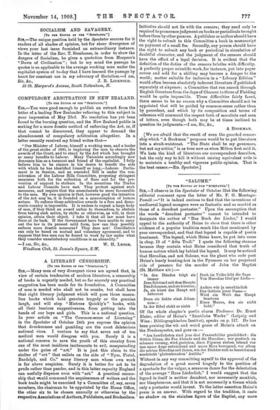A LITERARY CENSORSHIP.
[TO THE EDITOR OF THE " SFECTATOR."]
Sin,—Many men of very divergent views are agreed that, in view of certain tendencies of modern literature, a censorship of books is urgently needed, but so far scarcely any practical suggestion has been made for its foundation. A Committee of men is needed who shall not be cranks, but shall have that right literary judgment which will pass those mascu- line books which hold genuine tragedy or the genuine laugh, and will stop "Mistress Quickly's " books, with all their luscious suggestiveness, from getting into the bands of our boys and girls. This is a national question. In your article on "The Common-sense of Licensing" in the Spectator of October 24th you express the opinion that drunkenness and gambling are the most deleterious national vices. I venture to say that seven out of ten medical men would disagree with you. Surely it is a national_ concern to save the youth of. this country from one of the most insidious incitements to evil, masquerading under the guise of "alt" It is just this claim to the shelter of "art" that enlists on the side of " Nym, Bardolph, and Co." many literary men whose own work is far above suspicion. Surely it is better for art to be prude rather than pander, and in this latter capacity England can usefully dispense even with "art." A practical censor- ship that would command the acquiescence of writers and the book trade might be exercised by a Committee of, say, seven members, the chairman to be appointed by the Home Office, the other six to be chosen annually or otherwise by the respective Associations of Authors, Publishers, and Booksellers. Initiative should not lie with the censors; they need only be required to pronounce judgment on books or periodicals brought before them by other persons. A publisher or author should have the right to submit to this Committee a book in manuscript on payment of a small fee. Secondly, any person should have the right to submit any book or periodical in circulation of doubtful character, and the judgment of the censors should have the effect of a legal decision. It is evident that the definition of the duties of the censors bristles with difficulty. A perfectly proper scientific work, for instance, put into paper covers and sold for a shilling may become a danger to the world ; matter suitable for inclusion in a " Library Edition" would often become absolutely indecent literature if published separately at sixpence ; a Committee that ran amuck through English literature from the days of Chaucer to those of Fielding would be quite impossible. These difficulties fairly faced, there seems to be no reason why a Committee should not be appointed that will be guided by common-sense rather than by precedent, and which by its composition and terms of reference will command the respect both of moralists and men of letters, even though both may be at times inclined to question its judgments.—I am, Sir, &a.,
A BOOKMAN.
[We are afraid that the result of even the guarded censor- ship which "A Bookman" proposes would be to put literature into a strait-waistcoat. " The State shall be my governors, but not my critics," is as true now as when Milton first said it. We hate the kind of literature our correspondent describes, but the only way to kill it without raising equivalent evils is to maintain a healthy and vigorous public opinion. That is the best censor.—ED. Spectator.]










































 Previous page
Previous page